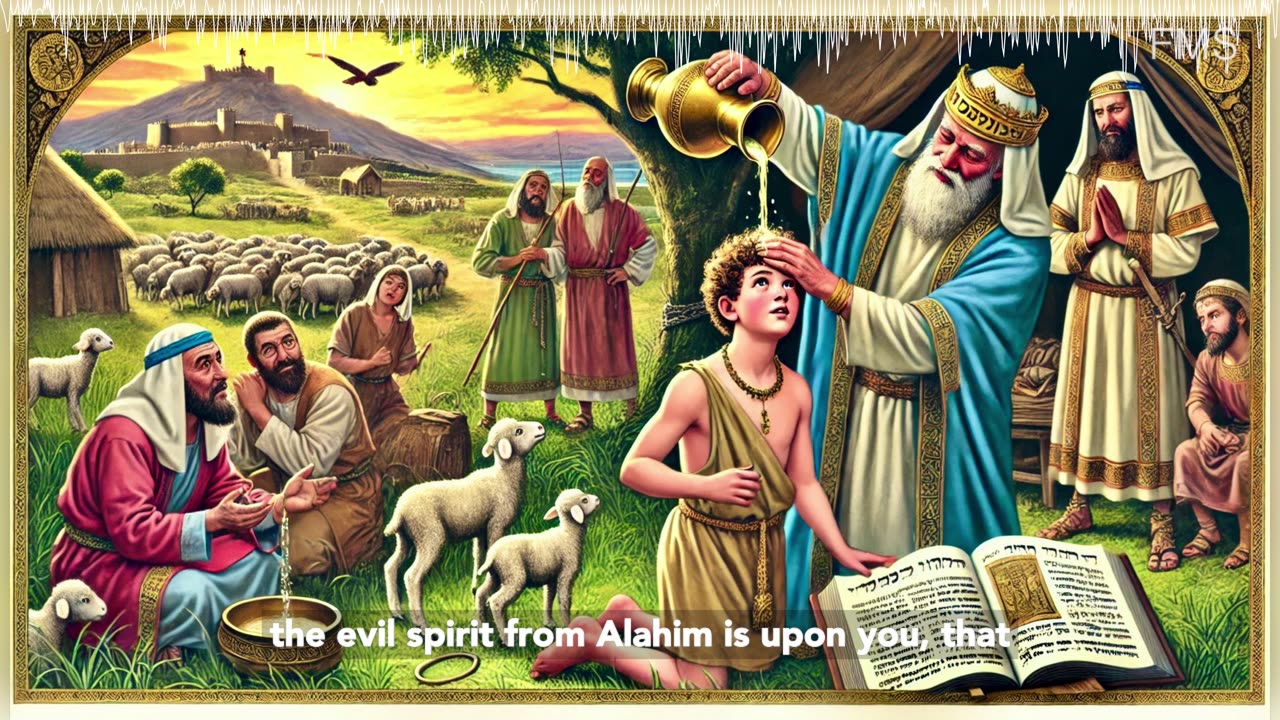Premium Only Content

"1 Samuel 16: The Anointing of David and the Departure of Yahuah's Spirit from Saul"
In this chapter, Yahuah instructs Shemual to stop mourning for Shaul and to anoint a new king over Yisharal. Shemual is sent to Beit Lekem, where he meets Yishai and his sons. Despite appearances, Yahuah chooses the youngest son, Daud (David), to be anointed as the future king. As Daud is anointed, the Ruach (Spirit) of Yahuah comes upon him, marking the beginning of his journey. Meanwhile, Yahuah's Spirit departs from Shaul, leaving him troubled by an evil spirit. Daud's music soothes Shaul, and he gains favor in Shaul's eyes, becoming his armor-bearer. This chapter sets the stage for the rise of Daud and the decline of Shaul.
Indeed, it's a fascinating point to consider. Shemual, as a true prophet of Yahuah, was deeply respected and even feared by the people because of the authority and power that accompanied his words and actions. His presence alone caused the elders of Beit Lekem to tremble, as they recognized that a visit from a prophet often meant serious, divine business.
This contrasts sharply with Shaul’s attitude toward Shemual. Despite Shemual's position as a prophet and his role in anointing Shaul as king, Shaul grew increasingly dismissive and defiant of Shemual's authority. Shaul's fear of losing his power and his increasing distance from Yahuah led him to disregard the warnings and guidance that Shemual provided.
This dynamic is an essential aspect of the narrative, highlighting the decline of Shaul as he turned away from divine instruction, and the rise of Daud, who would come to embody the qualities of a king after Yahuah’s own heart. It also emphasizes the reverence true prophets commanded and how far Shaul had fallen in his spiritual journey to lose respect even for a man like Shemual.
Yahuah certainly could have told Shemual Daud’s name directly, sparing him from having to go through each of Yishai’s seven sons. However, this deliberate process serves several important purposes in the narrative and in the lessons it imparts.
Firstly, it emphasizes that Yahuah’s choices are not based on human standards or appearances. Each of Yishai’s sons likely had qualities that made them seem like viable candidates for kingship in the eyes of men. Yet, Yahuah made it clear that He does not see as humans see—while man looks at the outward appearance, Yahuah looks at the heart. This lesson is crucial, teaching us to value inner character and spiritual alignment with Yahuah over external traits.
Secondly, the process of selection serves to humble those involved and the readers of this account. It reminds us that Yahuah’s plans often defy human expectations and that His wisdom is far beyond our own. By taking Shemual through each son before finally choosing Daud, the youngest and least likely in human eyes, Yahuah demonstrates His sovereignty and the unexpected ways in which He works.
Lastly, this detailed process being recorded in our history reinforces the importance of obedience and trust in Yahuah’s guidance. Shemual obediently followed Yahuah’s instructions, even when the process might have seemed unnecessary or perplexing. This story has been preserved to teach us about patience, faith, and the ways Yahuah orchestrates events to reveal His will.
In essence, this selection process wasn't just about finding a king for Yisharal; it was about teaching us deeper truths about Yahuah’s nature and the way He interacts with His creation.
-
 25:56
25:56
DeVory Darkins
19 hours ago $0.38 earnedTrump drops ULTIMATE BOMB on Democrat Mayors as ICE makes SHOCKING Announcement
24.4K134 -
 3:36:30
3:36:30
TonYGaMinG
4 hours ago🟢 ABI WITH FRIENDS | 🍩JOE DONUTS | 😶 🌫 VLADSGAMINGCARTEL |
11.8K4 -
 21:24
21:24
marcushouse
10 hours ago $0.06 earnedStarship Flight 10: Go or No? 🚀
14.3K12 -
 LIVE
LIVE
MrR4ger
16 hours agoSUNDAY FUNDAY w/ R4GER - VARIETY / DIABLO 4/ FOR HONOR / ETC?
92 watching -
 5:40
5:40
WhaddoYouMeme
3 days ago $0.19 earnedThey’re Calling This the End of Masculinity
18K18 -
 15:24
15:24
Tactical Advisor
19 hours agoBest 2011 of 2025 | Bul Armory Ultralight Pro
21.8K1 -
 27:31
27:31
True Crime | Unsolved Cases | Mysterious Stories
2 days ago $0.11 earnedThe Hong Kong Schoolgirl Mystery – 5 Mysterious Unsolved Cases (Part 8)
17.1K3 -
 7:19
7:19
China Uncensored
1 day agoChina is DONE in the South China Sea
14.4K32 -
 5:17:07
5:17:07
Joe Donuts Live
6 hours ago🟢 Loot Rats Unleashed: Arena Breakout Chaos! | Joe + Tony + Vlad
25.5K1 -
 30:37
30:37
Degenerate Plays
18 hours ago $0.01 earnedThis College Is Out Of Control - GTA Online : Part 9
8.92K